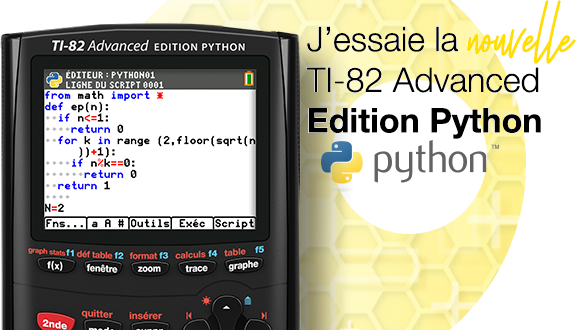Integration tests on 3 top-model CAS systems
23 posts
• Page 2 of 3 • 1, 2, 3
Re: Integration tests on 3 top-model CAS systems
#18: mod as it is in not defined on complexes, or at least I don't know of any agreed definition of it. By default everything was checked on complexes. So no use of mod. Same for #39.
#50: again, complex roots.
#52,53: Absolute value for a complex number means something else.
#68: here you do have a point. Nevertheless, the antiderivative given there is the same you're to find in textbooks - sure it is not the most handy thing but both of us know that things get wild around division by zero. Nevertheless, if anything, you should also know that a calculator doesn't replace brain - and when you see an n=-1 and the given antiderivative, you should see that it cannot be trusted. But I know of no CASes on calculators that throw you the warning signs. Some computer algebra systems do that, but even then, it's mostly turned off by the users of the same systems...
Looking at #68 when n=-1 is a curious thing. If we have an expression which is shaped like 1/(ArcTan(x)*(a+b*x^2)), I cannot think of any rule to apply. In our particular case, we can substitute u=arctan(x) and du=1/(x^2+1), then we get int(1/u du), which is log(u)+C... so we get ln(arctan(x)). But then again, when a coefficient has such values, it doesn't change the validity of the general equation - you yourself know the quadratic formula, I bet. x1,2=(-b +- Sqrt(b^2-4ac))/(2a). If you threw a first-order equation in there (where a is zero), you would get a division by zero, granted. Yet it doesn't mean that the general equation is invalid - rather that it has some values which are special. Most integrals are like that - and you might also know the cases where you set the integration range to places where the integral doesn't exist, but that doesn't automatically mean that the area between the two cannot be determined. There are cases when you can still do that.
Mind you: I like it if people disagree. Not because I like to piss them off, but because it shows they actually care about what I say or write. Agreeing is way too easy. Therefore, thank you for your thinking about it.
#50: again, complex roots.
#52,53: Absolute value for a complex number means something else.
#68: here you do have a point. Nevertheless, the antiderivative given there is the same you're to find in textbooks - sure it is not the most handy thing but both of us know that things get wild around division by zero. Nevertheless, if anything, you should also know that a calculator doesn't replace brain - and when you see an n=-1 and the given antiderivative, you should see that it cannot be trusted. But I know of no CASes on calculators that throw you the warning signs. Some computer algebra systems do that, but even then, it's mostly turned off by the users of the same systems...
Looking at #68 when n=-1 is a curious thing. If we have an expression which is shaped like 1/(ArcTan(x)*(a+b*x^2)), I cannot think of any rule to apply. In our particular case, we can substitute u=arctan(x) and du=1/(x^2+1), then we get int(1/u du), which is log(u)+C... so we get ln(arctan(x)). But then again, when a coefficient has such values, it doesn't change the validity of the general equation - you yourself know the quadratic formula, I bet. x1,2=(-b +- Sqrt(b^2-4ac))/(2a). If you threw a first-order equation in there (where a is zero), you would get a division by zero, granted. Yet it doesn't mean that the general equation is invalid - rather that it has some values which are special. Most integrals are like that - and you might also know the cases where you set the integration range to places where the integral doesn't exist, but that doesn't automatically mean that the area between the two cannot be determined. There are cases when you can still do that.
Mind you: I like it if people disagree. Not because I like to piss them off, but because it shows they actually care about what I say or write. Agreeing is way too easy. Therefore, thank you for your thinking about it.
Last edited by quinyu on 08 Jun 2015, 00:31, edited 1 time in total.
-

quinyu 
Niveau 3: MH (Membre Habitué)- Posts: 9
- Joined: 07 Jun 2015, 20:06
- Gender:

- Calculator(s):→ MyCalcs profile
- Class: low
Re: Integration tests on 3 top-model CAS systems
Adriweb, you forget I need to typeset it neatly - compared to that, the feeding of the equations into the calculators is not much. Word and MM are lazy asses. Even if they do a reasonably neat job.
-

quinyu 
Niveau 3: MH (Membre Habitué)- Posts: 9
- Joined: 07 Jun 2015, 20:06
- Gender:

- Calculator(s):→ MyCalcs profile
- Class: low
Re: Integration tests on 3 top-model CAS systems
The TI-Nspire CAS throws warnings  .
.
(well, at least it can. It does, but not as much as I'd like)
 .
.(well, at least it can. It does, but not as much as I'd like)
-

ExcaleAdmin 
Niveau 16: CC2 (Commandeur des Calculatrices)- Posts: 2955
- Images: 3
- Joined: 10 Sep 2010, 00:00
- Gender:

- Calculator(s):→ MyCalcs profile
Re: Integration tests on 3 top-model CAS systems
If you want your results to be valid for complexes... then you should tell it to the calc !
The Nspire needs to be warned that a variable is complex by putting an underscore at the end of its name. If you don't put it, the variable is understood real.
For example, for #50, if you type
But, my interrogation becomes : when do you really need any antiderivative to be calculated over complex numbers ? In fact, very few functions are well defined above complex numbers (no root functions, no logarithms, no arcsine, etc...)... so why bother about that ?
The Nspire needs to be warned that a variable is complex by putting an underscore at the end of its name. If you don't put it, the variable is understood real.
For example, for #50, if you type
integral(x_/√(a_^4-x_^4),x_) it answers tan^-1(x_^2/√(a_^4-x_^4))/2 as you would expect.But, my interrogation becomes : when do you really need any antiderivative to be calculated over complex numbers ? In fact, very few functions are well defined above complex numbers (no root functions, no logarithms, no arcsine, etc...)... so why bother about that ?
-

BisamAdmin 
Niveau 15: CC (Chevalier des Calculatrices)- Posts: 5670
- Joined: 11 Mar 2008, 00:00
- Location: Lyon
- Gender:

- Calculator(s):→ MyCalcs profile
Re: Integration tests on 3 top-model CAS systems
This is quite an extensive piece of work, good job 
I'll let Bisam, parisse and others deal with math aspects.
The inferior and closed-source kArmTI should indeed be avoided.

I'll let Bisam, parisse and others deal with math aspects.
The inferior and closed-source kArmTI should indeed be avoided.
Membre de la TI-Chess Team.
Co-mainteneur de GCC4TI (documentation en ligne de GCC4TI), TIEmu et TILP.
Co-mainteneur de GCC4TI (documentation en ligne de GCC4TI), TIEmu et TILP.
-

Lionel DebrouxSuper Modo 
Niveau 14: CI (Calculateur de l'Infini)- Posts: 6873
- Joined: 23 Dec 2009, 00:00
- Location: France
- Gender:

- Calculator(s):→ MyCalcs profile
- Class: -
- GitHub: debrouxl
Re: Integration tests on 3 top-model CAS systems
I'm sorry, Bisam, but I have to disagree. If I tell the calc to integrate 1/x over the complexes, so typing integral(1/x_,x_), it still gives ln(x_). Strictly speaking, not valid on complexes precisely because (as you yourself mentioned) logarithm is ill-defined, at least from one point of view. But I'll let that slip for now.
Switched to the actual emu. I will do a quick run through the integrals where the TI failed, later. School first.
As of your question, namely why you would need an antiderivative over complexes. That's what contour integration revolves about. And almost every function (mind you I said "almost") has a well-defined main value as far as complexes are concerned. Furthermore, precisely because some functions behave differently, amongst them a few quite important ones, I expect to either get a warning from the calculator, or better yet, that it avoided said functions or substituted a suitable complex-compatible one. For example, the absolute value is one such function. On the complex plane, it means the distance from the origin, so for Abs(x+yi), you get sqrt(x^2+y^2), always a real; but that is generally not what is meant by the calculator. Or for that matter, which is why I am so much against using the mod function on complexes - given that a mod(x,y)=0 means there exists some z for which x=y*z. If we look at the complex numbers, it can be proven that there always exists such a z.
And dear Mr. Debroux, thank you very much! I thought these things already got through (that is, someone at TI-cares wrote they would be), but if not, then all the same, here they are and hope here they'll stay.
Switched to the actual emu. I will do a quick run through the integrals where the TI failed, later. School first.
As of your question, namely why you would need an antiderivative over complexes. That's what contour integration revolves about. And almost every function (mind you I said "almost") has a well-defined main value as far as complexes are concerned. Furthermore, precisely because some functions behave differently, amongst them a few quite important ones, I expect to either get a warning from the calculator, or better yet, that it avoided said functions or substituted a suitable complex-compatible one. For example, the absolute value is one such function. On the complex plane, it means the distance from the origin, so for Abs(x+yi), you get sqrt(x^2+y^2), always a real; but that is generally not what is meant by the calculator. Or for that matter, which is why I am so much against using the mod function on complexes - given that a mod(x,y)=0 means there exists some z for which x=y*z. If we look at the complex numbers, it can be proven that there always exists such a z.
And dear Mr. Debroux, thank you very much! I thought these things already got through (that is, someone at TI-cares wrote they would be), but if not, then all the same, here they are and hope here they'll stay.
-

quinyu 
Niveau 3: MH (Membre Habitué)- Posts: 9
- Joined: 07 Jun 2015, 20:06
- Gender:

- Calculator(s):→ MyCalcs profile
- Class: low
Re: Integration tests on 3 top-model CAS systems
Your answer gives some clues... but your beliefs are incorrect !
But you're right when saying that a calc should warn when it uses "ill-defined" functions, as you said.
Even though, I still don't see the point for asking the result to be valid when the variable is complex.
- Contour integrations does not compute any complex integration... the value of the functions are complex but not the variable involved which is always real.
- On every calc that I know handling complex numbers, abs(z) means the module of z when z is a complex number. I don't see your point.
- You're wrong too for the signification of mod(x,y)=0. It means that there exists an INTEGER (that may be negative) k for which x=k*y. It is also available for x and y being complexes.
But you're right when saying that a calc should warn when it uses "ill-defined" functions, as you said.
Even though, I still don't see the point for asking the result to be valid when the variable is complex.
-

BisamAdmin 
Niveau 15: CC (Chevalier des Calculatrices)- Posts: 5670
- Joined: 11 Mar 2008, 00:00
- Location: Lyon
- Gender:

- Calculator(s):→ MyCalcs profile
Re: Integration tests on 3 top-model CAS systems
Bisam, so your suggestion is to do away with using the complex mode of the calculators during integration testing? It would make things a little easier (no doubt also for the calculators), but then the fact still remains that the calculators do integration in complex mode without hesitation (except the HP that reminds you that in general it's not a good idea).
But then what if I want to evaluate actual integration on a complex variable? Should the calculator flat-out refuse doing it? Should it sneakily switch back to real mode? Should it pop up a window calling me a dumbass and then still do it? Because here we see three manufacturers, in essence each trying to top the other two; and none of them opted for any of these methods (except HP once again, but even there it's not more than a reminder.) Nothing prevents users to actually integrate over complexes, or what they think complexes; not even requiring them to do an explicit declaration that that's what they want to do. No "assuming x is real" in the given result. This way, one trusts the answer that might end up wrong due to complex mode being on.
I know that I have said brains are also needed to actually know if something can be counted as a result or not. But then there is also the question of user friendliness… which you would expect from a calculator that does flashy things like multimedia. True, I might be alone with my ideas or at any rate be in the minority; but I like to trust my calc. Which is why I was so disappointed when the 991DE gave me her refusal to calculate i^i in complex mode, reporting a "Math. error". It has a calculable value, after all. Hell, she even refuses to calculate i^4.
But then what if I want to evaluate actual integration on a complex variable? Should the calculator flat-out refuse doing it? Should it sneakily switch back to real mode? Should it pop up a window calling me a dumbass and then still do it? Because here we see three manufacturers, in essence each trying to top the other two; and none of them opted for any of these methods (except HP once again, but even there it's not more than a reminder.) Nothing prevents users to actually integrate over complexes, or what they think complexes; not even requiring them to do an explicit declaration that that's what they want to do. No "assuming x is real" in the given result. This way, one trusts the answer that might end up wrong due to complex mode being on.
I know that I have said brains are also needed to actually know if something can be counted as a result or not. But then there is also the question of user friendliness… which you would expect from a calculator that does flashy things like multimedia. True, I might be alone with my ideas or at any rate be in the minority; but I like to trust my calc. Which is why I was so disappointed when the 991DE gave me her refusal to calculate i^i in complex mode, reporting a "Math. error". It has a calculable value, after all. Hell, she even refuses to calculate i^4.
-

quinyu 
Niveau 3: MH (Membre Habitué)- Posts: 9
- Joined: 07 Jun 2015, 20:06
- Gender:

- Calculator(s):→ MyCalcs profile
- Class: low
Re: Integration tests on 3 top-model CAS systems
Well, I'm not a CAS programmer (but another of our users, parisse, is the one who made the CAS engine for HP Prime) so I can't tell why they chose this, but I can imagine the difficulties.
I'm not here to say your benchmark is biased or so on.
I was just pointing details and asking for more information.
As a math teacher, I can't let you say, for example, that writing
To make things even more clear, I am not thinking that YOU are wrong when trying to make these calculations, but that the calc is wrong to let you make them. Most of the time, using complexes can be avoided... and when it may be interesting, the calc often doesn't do the calculation you would have liked.
I hope my questions didn't bother you and that you will go on helping community by making some of these tests again (or anything else...)
I'm not here to say your benchmark is biased or so on.
I was just pointing details and asking for more information.
As a math teacher, I can't let you say, for example, that writing
$mathjax$\ln(i)$mathjax$
or $mathjax$i^{i}$mathjax$
makes sense... even if many calcs give an answer for both of these, without giving a f..k.To make things even more clear, I am not thinking that YOU are wrong when trying to make these calculations, but that the calc is wrong to let you make them. Most of the time, using complexes can be avoided... and when it may be interesting, the calc often doesn't do the calculation you would have liked.
I hope my questions didn't bother you and that you will go on helping community by making some of these tests again (or anything else...)
-

BisamAdmin 
Niveau 15: CC (Chevalier des Calculatrices)- Posts: 5670
- Joined: 11 Mar 2008, 00:00
- Location: Lyon
- Gender:

- Calculator(s):→ MyCalcs profile
Re: Integration tests on 3 top-model CAS systems
Certainly. While it will be no small undertaking to do them again (typesetting a little more than 900 antiderivatives, assuming they're given differently, but then again I hope only a few are...). The calculators certainly will give a bunch more absolute values.
As of knows this, also the Prime; the ClassPad II doesn't seem to know the first, only the second... *figures*.
knows this, also the Prime; the ClassPad II doesn't seem to know the first, only the second... *figures*.
At any rate, I've restarted the run through, no doubt it will massively improve a lot of things, as far as horribly complicated and/or not done integrals are concerned.
As of
$mathjax$\mathbb{i} ^ \mathbb{i}$mathjax$
, it is $mathjax$\mathrm{e} ^ {-\frac{\pi}{2}}$mathjax$
, whereas $mathjax$\ln(\mathbb{i})$mathjax$
is $mathjax$\frac{\mathbb{i}\pi}{2}$mathjax$
. The  knows this, also the Prime; the ClassPad II doesn't seem to know the first, only the second... *figures*.
knows this, also the Prime; the ClassPad II doesn't seem to know the first, only the second... *figures*.At any rate, I've restarted the run through, no doubt it will massively improve a lot of things, as far as horribly complicated and/or not done integrals are concerned.
-

quinyu 
Niveau 3: MH (Membre Habitué)- Posts: 9
- Joined: 07 Jun 2015, 20:06
- Gender:

- Calculator(s):→ MyCalcs profile
- Class: low
23 posts
• Page 2 of 3 • 1, 2, 3
Return to Maths, physique, informatique et autre...
Who is online
Users browsing this forum: ClaudeBot [spider] and 9 guests














